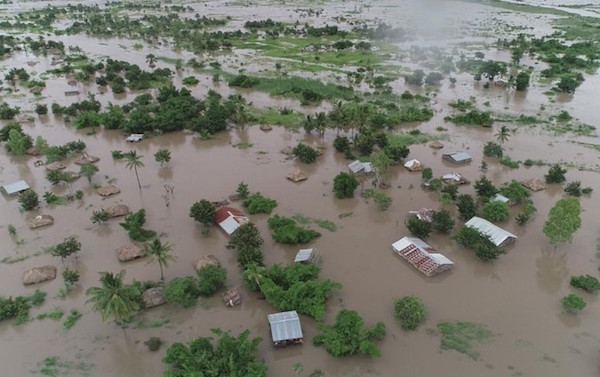Malawi
See the following -
AHRQ Providing Support for OpenMRS
As the AHRQ report explains it, “PIH and the Regenstrief Institute in Indianapolis conceived of OpenMRS in 2005 as a flexible, open source EMR that would be capable of meeting the demand for high-quality health information in developing countries such as Rwanda and Kenya, where the two organizations were then working. Read More »
- Login to post comments
Application Deadline to Host OpenMRS 2018 Annual Implementers Meet Coming Up
 The deadline to apply to host the 2018 International OpenMRS Implementers conference is coming up on April 30 [updated]. Nations that want to host the meeting need to answer the detailed questionnaire by that time. For those Open Health News readers who have missed one of the greatest health IT stories of the decade, the Government of Uganda hosted the 2016 OpenMRS meeting in their capital city of Kampala. The conference was such an extraordinary success that a large number of other national governments volunteered to host the 2017 Implementer's conference. There are currently close to 40 countries around the world where OpenMRS is being implemented throughout the county in large-scale deployments.
The deadline to apply to host the 2018 International OpenMRS Implementers conference is coming up on April 30 [updated]. Nations that want to host the meeting need to answer the detailed questionnaire by that time. For those Open Health News readers who have missed one of the greatest health IT stories of the decade, the Government of Uganda hosted the 2016 OpenMRS meeting in their capital city of Kampala. The conference was such an extraordinary success that a large number of other national governments volunteered to host the 2017 Implementer's conference. There are currently close to 40 countries around the world where OpenMRS is being implemented throughout the county in large-scale deployments.
- The Future Is Open
- Login to post comments
Condom Airborne Meds: 6 Ways Drones Could Change Health Care
 Drones have been used to deliver sunscreen to a conference in Palm Springs, Calif., and pizza to a family in New Zealand, but they’re also in the air for far more urgent purposes — such as saving lives. In fact, in some cases, drones could carry defibrillators to heart attack victims faster than an ambulance, according to a paper published Tuesday in the Journal of the American Medical Association. Researchers simulated emergency situations and found they could get automatic external defibrillators to the scene an average of 16 minutes faster by drone than by ambulance...
Drones have been used to deliver sunscreen to a conference in Palm Springs, Calif., and pizza to a family in New Zealand, but they’re also in the air for far more urgent purposes — such as saving lives. In fact, in some cases, drones could carry defibrillators to heart attack victims faster than an ambulance, according to a paper published Tuesday in the Journal of the American Medical Association. Researchers simulated emergency situations and found they could get automatic external defibrillators to the scene an average of 16 minutes faster by drone than by ambulance...
- Login to post comments
Developing Nations Improving Health Communication Through the Use of DHIS2 (Part 1)
 DHIS2 implementations are spreading steadily among national health services in developing countries as well as among international non-governmental organizations (NGOs) working to improving health in the developing world through the use of health information technology. As an open source solution, DHIS2 offers developing countries the advantage of adopting a cost-effective and flexible solution for aggregate statistical data collection, validation, analysis, management, and presentation as well as for data sharing between healthcare professionals and facilities. Organizations and individuals who work with humanitarian software solutions will need to know what DHIS2 is, how it works, and how it might be implemented by national health services and other health-related projects across the globe...
DHIS2 implementations are spreading steadily among national health services in developing countries as well as among international non-governmental organizations (NGOs) working to improving health in the developing world through the use of health information technology. As an open source solution, DHIS2 offers developing countries the advantage of adopting a cost-effective and flexible solution for aggregate statistical data collection, validation, analysis, management, and presentation as well as for data sharing between healthcare professionals and facilities. Organizations and individuals who work with humanitarian software solutions will need to know what DHIS2 is, how it works, and how it might be implemented by national health services and other health-related projects across the globe...
- Login to post comments
DHIS2 - Transforming Health IT Standards in the Developing World (Part 2)
 Rwanda's 2012 implementation of DHIS2 is one of at least 16 completed national rollouts of this free and open source health data management. A total of 54 countries are deploying DHIS2 on a national scale, 30 of which are in the pilot stage or early phase in their rollouts. Since DHIS2's release in 2006, NGOs and national governments in 60 countries have deployed DHIS2 for health-related projects, including patient health monitoring, improving disease surveillance and pinpointing outbreaks, and speeding up health data access.
Rwanda's 2012 implementation of DHIS2 is one of at least 16 completed national rollouts of this free and open source health data management. A total of 54 countries are deploying DHIS2 on a national scale, 30 of which are in the pilot stage or early phase in their rollouts. Since DHIS2's release in 2006, NGOs and national governments in 60 countries have deployed DHIS2 for health-related projects, including patient health monitoring, improving disease surveillance and pinpointing outbreaks, and speeding up health data access.
- Login to post comments
Drones and the Future of Disaster Response
 Four continental states and one U.S. territory took a beating this fall as one natural disaster after another rocked communities in Northern California and along the Gulf Coast, spreading disaster relief resources and personnel thin as federal, state, and local governments scrabbled to address the crises. Wildfires in California's wine country claimed at least 42 lives, 8,400 structures, and 245,000 acres of land in October. Hurricanes Harvey and Irma pummeled Louisiana, Texas, and Florida only to be followed by Hurricane Maria, which slammed Puerto Rico on September 20 and left much of the U.S. territory without communications systems, electricity, clean water, or functioning hospitals....
Four continental states and one U.S. territory took a beating this fall as one natural disaster after another rocked communities in Northern California and along the Gulf Coast, spreading disaster relief resources and personnel thin as federal, state, and local governments scrabbled to address the crises. Wildfires in California's wine country claimed at least 42 lives, 8,400 structures, and 245,000 acres of land in October. Hurricanes Harvey and Irma pummeled Louisiana, Texas, and Florida only to be followed by Hurricane Maria, which slammed Puerto Rico on September 20 and left much of the U.S. territory without communications systems, electricity, clean water, or functioning hospitals....
- Login to post comments
Ending Poverty: There's an Open Source App for That!
 Rural Africa presents changemakers with intractable challenges across sectors, but one American investor, Grameen Foundation, believes it all comes down to access to information. Grameen Foundation has invested millions to develop mobile-phone applications that leapfrog over a lack of electricity, education, and income. Building on their legacy of leading-edge ideas, Grameen Foundation has evolved from funding microfinance to designing disruptive solutions to the kind of poverty that's most challenging to reach, in remote rural areas, and to the poorest of the poor. Since more people have access to cell phones than toilets in Africa, Grameen Foundation brings increased agricultural productivity, access to prenatal and infant healthcare, and a portfolio of financial services, to the poor--right into the palm of their hands.
Rural Africa presents changemakers with intractable challenges across sectors, but one American investor, Grameen Foundation, believes it all comes down to access to information. Grameen Foundation has invested millions to develop mobile-phone applications that leapfrog over a lack of electricity, education, and income. Building on their legacy of leading-edge ideas, Grameen Foundation has evolved from funding microfinance to designing disruptive solutions to the kind of poverty that's most challenging to reach, in remote rural areas, and to the poorest of the poor. Since more people have access to cell phones than toilets in Africa, Grameen Foundation brings increased agricultural productivity, access to prenatal and infant healthcare, and a portfolio of financial services, to the poor--right into the palm of their hands.
Global Open Source Health IT Project Gets $1 Million Donation From Cryptocurrency Philanthropy
 OpenMRS, Inc., an open source medical records platform used in developing countries, has received a $1 million donation from the Pineapple Fund, an $86 million cryptocurrency philanthropy created by an anonymous donor known only as “Pine.” Now in its 14th year, OpenMRS is being used in countries such as South Africa, Kenya, Rwanda, Lesotho, Zimbabwe, Mozambique, Uganda, Tanzania, Haiti, India, China, the United States, Pakistan, and many other places. This work is supported in part by many organizations including international and government aid groups, as well as for-profit and nonprofit corporations. Read More »
OpenMRS, Inc., an open source medical records platform used in developing countries, has received a $1 million donation from the Pineapple Fund, an $86 million cryptocurrency philanthropy created by an anonymous donor known only as “Pine.” Now in its 14th year, OpenMRS is being used in countries such as South Africa, Kenya, Rwanda, Lesotho, Zimbabwe, Mozambique, Uganda, Tanzania, Haiti, India, China, the United States, Pakistan, and many other places. This work is supported in part by many organizations including international and government aid groups, as well as for-profit and nonprofit corporations. Read More »
- Login to post comments
How Can Information and Communications Tech Help in Disaster Preparedness and Response?
 n the immediate aftermath of disasters, timely and effective information is critical for the decision-making process. Information and Communication Technologies (ICTs) play a significant role in mitigation, preparedness, response, and rehabilitation by facilitating the flow of vital information in a timely manner. To deliver and deploy telecommunications / information and communication resources (transportable, easy to deploy and reliable systems that are non-exclusive) in a timely manner in the event of disasters, the ITU has designed the ITU Framework for Cooperation in Emergencies (IFCE). Innovative technologies such as robotics, drone technology, GIS, and emerging technologies like artificial intelligence (AI), the Internet of Things (IoT), cloud computing and Big Data are transforming the complex process of disaster management.
n the immediate aftermath of disasters, timely and effective information is critical for the decision-making process. Information and Communication Technologies (ICTs) play a significant role in mitigation, preparedness, response, and rehabilitation by facilitating the flow of vital information in a timely manner. To deliver and deploy telecommunications / information and communication resources (transportable, easy to deploy and reliable systems that are non-exclusive) in a timely manner in the event of disasters, the ITU has designed the ITU Framework for Cooperation in Emergencies (IFCE). Innovative technologies such as robotics, drone technology, GIS, and emerging technologies like artificial intelligence (AI), the Internet of Things (IoT), cloud computing and Big Data are transforming the complex process of disaster management.
- Login to post comments
Nineteen Countries Save $149 Million With Open Source Health Workforce Information Systems
Nineteen countries are now using iHRIS, a free and open source human resources information system, to support over 810,000 health worker records. It would cost more than $149 million in licensing fees alone for these countries to support a similar number of records with a proprietary system purchased from for-profit companies.
- Login to post comments
Open Government Partnership Celebrates Open Innovation in Africa
 As diverse delegates gather in Cape Town this week for the OGP regional meeting, we reflect on open innovation, ODI projects and promising initiatives in the continent. This week, South Africa hosts the third Open Government Partnership (OGP) Africa Regional Meeting 2016. The two-day event brings together a wide range of delegates from African governments and civil society, startups and international organisations. It offers a platform to share lessons from programmes across the continent, with a particular focus on promoting sustainable development...
As diverse delegates gather in Cape Town this week for the OGP regional meeting, we reflect on open innovation, ODI projects and promising initiatives in the continent. This week, South Africa hosts the third Open Government Partnership (OGP) Africa Regional Meeting 2016. The two-day event brings together a wide range of delegates from African governments and civil society, startups and international organisations. It offers a platform to share lessons from programmes across the continent, with a particular focus on promoting sustainable development...
- Login to post comments
OpenMRS Community Announces Malawi will be the Host Country for OMRS17
 OpenMRS Global Events Manager Christine Gichuki announced yesterday that Malawi has been chosen as the host country for the OpenMRS 2017 implemeters meeting (OMRS17). This is a major milestone for the OpenMRS project. OMRS16 was hosted by the government of Uganda last year. The conference was a major success as I decribed in a presentation at the recent OSEHRA 2017 meeting in Bethesda, Maryland. This will be the second OMRS meeting that is hosted the by a national goverment. The incredibly successful meeting in Uganda is described in this article.
OpenMRS Global Events Manager Christine Gichuki announced yesterday that Malawi has been chosen as the host country for the OpenMRS 2017 implemeters meeting (OMRS17). This is a major milestone for the OpenMRS project. OMRS16 was hosted by the government of Uganda last year. The conference was a major success as I decribed in a presentation at the recent OSEHRA 2017 meeting in Bethesda, Maryland. This will be the second OMRS meeting that is hosted the by a national goverment. The incredibly successful meeting in Uganda is described in this article.
- The Future Is Open
- Login to post comments
Paul Biondich - One Million Reasons to Celebrate our Amazing OpenMRS Community…
 Today, I’m thrilled to announce that OpenMRS, Inc. received a $1 million dollar donation from the Pineapple Fund. This donation came as a product of a competitive application process, awarded to initiatives that demonstrate international-scale impact and novel, innovative ways of solving society’s most vexing problems. We are looking forward to using this generous donation to further support our strategic goals, and to increase the long-term sustainability of the OpenMRS community. Stay tuned for more specifics about this important contribution in the days to come.
Today, I’m thrilled to announce that OpenMRS, Inc. received a $1 million dollar donation from the Pineapple Fund. This donation came as a product of a competitive application process, awarded to initiatives that demonstrate international-scale impact and novel, innovative ways of solving society’s most vexing problems. We are looking forward to using this generous donation to further support our strategic goals, and to increase the long-term sustainability of the OpenMRS community. Stay tuned for more specifics about this important contribution in the days to come.
- Login to post comments
Report on the Global OpenMRS Community Meeting in Malawi - Towards Evidence Based Health Service Delivery and Interoperability
 One hundred seventy five members of the worldwide OpenMRS community–representing 20 countries–met in Malawi this past December for the 2017 OpenMRS Implementers’ Conference. This event was the second consecutive year a national government sponsored this global meetup, with Uganda hosting and sponsoring this meeting the previous year. The December conference was hosted by Malawi’s Ministry of Health and key-noted by ministry officials and leaders such Maganizo Monawe, Senior HIS Technical Advisor; and Anthony Muyepa, Director General at National Commission for Science and Technology.
One hundred seventy five members of the worldwide OpenMRS community–representing 20 countries–met in Malawi this past December for the 2017 OpenMRS Implementers’ Conference. This event was the second consecutive year a national government sponsored this global meetup, with Uganda hosting and sponsoring this meeting the previous year. The December conference was hosted by Malawi’s Ministry of Health and key-noted by ministry officials and leaders such Maganizo Monawe, Senior HIS Technical Advisor; and Anthony Muyepa, Director General at National Commission for Science and Technology.
- Login to post comments
Revealed: The World's Most & Least Advanced Countries
UNTIL recently, the popular way to compare the progress of one country relative to another was to use the size of their economies. America had the biggest GDP (and almost the biggest per capita GDP), so it stood to reason it was the most advanced country in the world.
- Login to post comments